|
De Britse dichter en schrijver Dannie Abse werd geboren op 22 september 1923 in Cardiff, Wales. Zie ook mijn blog van 22 september 2010 en eveneens alle tags voor Dannie Abse op dit blog.
The Old Gods - Poem by Dannie Abse
The gods, old as night, don't trouble us.
Poor weeping Venus! Her pubic hairs are grey,
and her magic love girdle has lost its spring.
Neptune wonders where he put his trident.
Mars is gaga - illusory vultures on the wing.
Pluto exhumed, blinks. My kind of world, he thinks.
Kidnapping and rape, like my Front Page exploits
adroitly brutal - but he looks out of sorts when
other unmanned gods shake their heads tut tut,
respond boastingly, boringly anecdotal.
Diana has done a bunk, fearing astronauts.
Saturn, Time on his hands, stares at nothing and
nothing stares back. Glum Bacchus talks ad nauseam
of cirrhosis and small bald Cupid, fiddling
with arrows, can't recall which side the heart is.
All the old gods have become enfeebled,
mere playthings for poets. Few, doze or daft,
frolic on Parnassian clover. True, sometimes
summer light dies in a room - but only
a bearded profile in a cloud floats over.
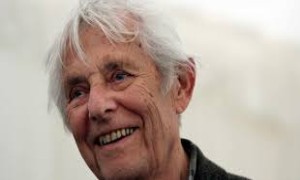
Dannie Abse (Cardiff, 22 september 1923 – 28 september 2014)
Portret door Peter Douglas Edwards, 1980
De Nederlandse dichter, schrijver en criticus Lodewijk van Deyssel werd geboren op 22 september 1864 in Amsterdam. Zie ook mijn blog van 22 september 2010 en eveneens alle tags voor Lodewijk van Deyssel op dit blog.
Burgerhuisje
Door 't burger-huis op laten middag traden
Wij de open lucht in, waar seringen-geur
Hing over de achterdeur en lente-wind
Stil witte wolken dreef door 't hemelblauw.
Een kleine stadse tuin, alzijds bemuurd
Door grauwe steen, en waar een enge ring
Groen gras en witte kiezel 't perk
Veelkleurge bloemen, 't éénge, rond omsloot.
Luwte beving ons, zon op achtermuur
Scheen goud, geluid van schelpjes aan de zee
Maakte de kiezel onder 't zachte gaan.
Seringenblaadjes streelden langs ons heen,
Rozen, violen, en purpre papaver
Bloeiden, en ginds in killen schaduwhoek
De schuchtre blanke lelietjes-van-dalen.
Zó rijk, zó schoon leefde in die lutle tuin
De volle lente, dat ik dralend toef
Voor 'k met een klánk nog de herinnering
Diepst doe herleven: blijde gekwinkel
Van klokkentoren daalde spelend neer
Langs steile muur, door luwte in 't loof, verzellend
Ons stille spreken. Toren verborgen
Achter de muren, slechts een enkle dag,
Een feestdag, deed gij meerder dan 't gewoon,
Niet meer bespeurde, daaglijks zelfde, tinklen,
En zong ge, telkens weer, de uren door...
De zoele wind en 't heldre spelen wiegden
Mijn ziel in sluimring, makend zon en bloemen,
Gras-rand en pad tot kleurig droomtafreel.
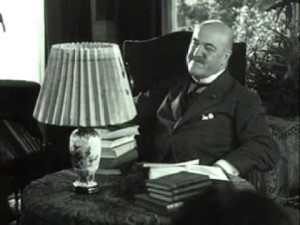
Lodewijk van Deyssel (22 september 1864 - 26 januari 1952)
De Australische singer / songwriter, dichter, schrijver en acteur Nicholas Edward Cave werd geboren in Warracknabeal op 22 september 1957. Zie ook alle tags voor Nick Cave op dit blog.
Uit:And the Ass Saw the Angel
“And I know why our friendship must be kept a secret. Or they will kill You like they killed You in the Bible. And then we could not be together. If not for them we would live in this valley together. As best friends. But we must be careful, Jesus. I think I would die if anything happened to You...' - she cried ah think, for ah could hear her little sobs as she spoke - '...just close my eyes and die.' And she let fall a heavy tear, and it passed through the slats and exploded upon mah face, just below the right cheek. And as the droplet began to roll, ah caught it with mah tongue. And ah was shocked momentarily by that tear's sweetness, having known them only as bitter things - only bitter things - always bitter things.”
(...)
“...because once you've got one scar on your face or your heart, its only a matter of time before someone gives you another - and another - until a day doesn't go by when you aren't being bashed senseless, nor a town that you haven't been run out of, and you get to be such a goddamn mess that finally it doesn't feel right unless you're getting the Christ beaten out of you - amd within a year of that first damming fall, those first down borne fists, your first run out, you wind up with flies buzzing around your eyes, back at the same place, the same town, deader than when you left, bobbiong around in the swill - a dirty deadbeat whore in a roadside ditch. But a little part of you deosn't die. A little part of you lives on. And you make an orphan of that corrupt and contemtible part, dumping it right smack in the laps of the ones who first robbed you of your sweetness, for it is the wicked fruit of their crimes, it is their blood, their sin, it belongs there, this child of blood, this spawn of sin...”

Nick Cave (Warracknabeal , 22 september 1957)
De Britse schrijfste Fay Weldon werd geboren op 22 september 1931 in Alvechurch, Engeland. Zie ook mijn blog van 22 september 2010 en eveneens alle tags voor Fay Weldon op dit blog.
Uit: Run Daddy And Ask If He Has Any More Money
"David, this has to stop," Bettina had said to him in the History Tutorial Room one day, seven years ago. "You are a married man and I'm going to be married too. The ceremony is next week. I wanted to tell you earlier but didn't like to, because I didn't want to upset you. You are the only man I'll ever really love but I have to think of my future. We have to be realistic. You could never support two homes in any comfort and I'm just not cut out for employment. I'm not that kind of person." He'd thought his heart would break. He was surprised it went on beating. Later he'd told himself he was lucky to be out of a trivial, passing affair with such an unfeeling, whimsical person, but he'd never really believed himself. The truth was that he'd taken no real pleasure since in Milly's straight hair and earnest face. He could see Milly was good, but what a man wanted was something more than honest worth. Sometimes he felt guilty because others called his wife Frilly Mood, ironically, but then he'd tell himself she'd always been like that. Not his doing.
His blood ran cold--I say this advisedly. When David heard Bettina's voice--last heard on the floor behind the sofa in the History Tutorial Room--echoing through the shop at two minutes past four, he felt a chill strike down his head to his right shoulder, into his arm and down to his fingers, and he had the feeling that if that section of blood didn't warm up before it got back up to his heart, that organ would freeze and this time stop once and for all. So much a heart can stand, no more.
David turned his back on his customers, lest he be seen and recognised by Bettina, and busied himself looking for a Peruvian crucifixion scene, grateful that his heart had survived the shock. But not before he had seen the little girl obediently leave her mother's side and head through shopping bags and spring-clad elbows towards her father. Bettina, near the door, was clearly interested in purchasing the papier-mache bowl at 65 [pounds sterling]; Daddy flicked through Easter cards at the back of the shop."
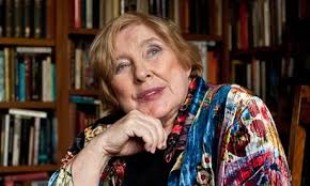
Fay Weldon (Alvechurch, 22 september 1931)
De Hongaarse dichter en schrijver György Faludy werd geboren op 22 september 1910 in Boedapest. Zie ook mijn blog van 22 september 2010 en eveneens alle tags voor György Faludy op dit blog.
Michelangelo's Last Prayer
Your anvil is the earth, spanning the sky
your arm describes the orbit of the sun.
I’ve worked seventy-six years on the high
scaffold but could not find you, mighty one.
I shape the marble, but it goes awry
into dead idols when the work is done.
The dreamy rainbows now elude my eye
that used to see them under every stone.
Now I’m a weathered rock, it is my turn
to be ill-temperaed, tortured, taciturn,
but in my soul the rainbows brightly shine.
How can I breach my body’s prison gate?
Strike me, if you can love this reprobate:
I am the marble, Stone-carver Divine!
My English Reader
In Toronto the locals tried to warn me very soon
that young roughs rob pedestrians in parks and lonely streets,
but I didn’t listen. Then on a spring afternoon,
carrying a bagful of milk, various cheeses and meats,
I was walking on my way home. A tall young African
ran straight towards me, grabbed my shopping bag as he got near
and seized me firmly. No doubt, he will stab me, if he can.
He was panting after his spurt. I was trembling with fear.
Is he going to strangle me, this barbarous disgrace?
I watched his heavy lips become a smile across his face.
He was enjoying it. Shall I shout? “He kills me, the beast!”
But the street was empty. There was no help within sight.
He went on squeezing me harder and said, as he squeezed:
“Let me embrace you. I adore the poems you write.”
Vertaald door Peter Zollman
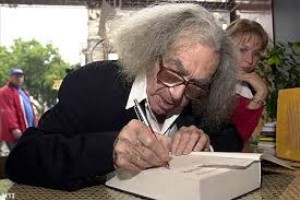
György Faludy (22 september 1910 – 1 september 2006)
De Duitse dichter en schrijver Hans Leip werd geboren op 22 september 1893 in Hamburg. Zie ook alle tags voor Hans Leip op dit blog.
Uit: Die Nächtezettel der Sinsebal
"Nun hebt sich meine Decke steil. Sie liegt der schwarzen Nacht auf.
O du süßer Tisch! War ich ein klein Kind, daß ich darunter kroch, in Dielenritzen die Nadeln stach, die meiner Mutter vom Schoß fielen. Silberne Nadelknopfreihe wie sanfte Abendperlen, die nicht weh tun, gebettet im Feudeldreck. Wann war denn die Zeit, daß die Spitzen sich wandten, in meine Finger stachen, in meine Schultern, in meine Knie, in meine roten Lippenkreise?
Kleine Nacht! Ach, kleine Sammetpfotennacht, wie schwarz machst du die Tropfen Blut, darob doch meine Augen schlafen sollen. Bist du verliebt in mich? O du, verliebt, daß ich an dich und an keins gedenken soll. Still! Nun ist meine Hand dir über! Schmal steigt sie über dich, scharf auf, hell von Mond. Nun bist du hart zurück, so flach, so steil gestreckt. Was will meine weiße Decke hinter meiner Hand? Sie spreitet sich dir an, du trägst sie, starr dir angelegt, kleine, einsame Nacht.
Was geht meine Hand von mir? Ist meine Hand mir über? Nun legt sie alle Nadeln von mir fort, aus meinen Fingern, aus meinen Schultern, meinen Knien, aus meinen roten Lippenringen, die im Herzen sich verflechten.
Hatte ich ein Nadelkissen, hergeweht ein Geschenk, war wie eins der kleinen Brüste, als ich sechzehn war.
Nun liegt eine Hand mir breit gehöhlt. O Lust, sprich nicht von ferne! O andre Hand, du klirrst vom Schreiben der Stunden. Von allen Spitzen schreibt das schwarze Nachtblut, Wort, Schrei und das erstickte Nichts, auch den Pulsschlag, Liebster, als du schliefest, und die Geschichten zwischen Wand und Unerforschlichkeit.
Nun hebt sich meine Decke wie ein Blatt. Nun ritzen alle Nadeln ihren Weg. Nun hebt sich meine Decke wie ein Buch.
Nun blättern seine Seiten aus mir auf.”
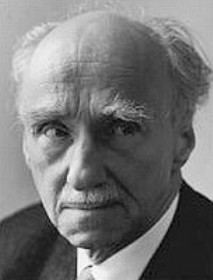
Hans Leip (22 september 1893 – 6 juni 1983)
Zie voor nog meer schrijves van de 22e september ook mijn blog van 22 september 2013 deel 2.
|



